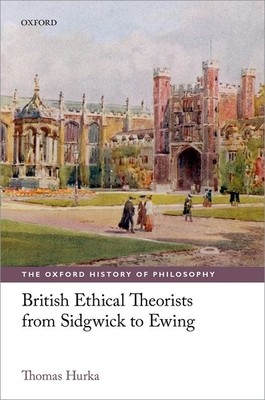
- We will send in 10–14 business days.
- Author: Thomas Hurka
- Publisher: Oxford University Press, USA
- ISBN-10: 0199233624
- ISBN-13: 9780199233625
- Format: 15.2 x 23.4 x 2.5 cm, hardcover
- Language: English
- SAVE -10% with code: EXTRA
Reviews
Description
Thomas Hurka presents the first full historical study of an important strand in the development of modern moral philosophy. His subject is a series of British ethical theorists from the late nineteenth century to the mid-twentieth century, who shared key assumptions that made them a unified and distinctive school. The best-known of them are Henry Sidgwick, G. E. Moore, and W. D. Ross; others include Hastings Rashdall, H. A. Prichard, C. D. Broad, and A. C. Ewing. They disagreed on some important topics, especially in normative ethics. Thus some were consequentialists and others deontologists: Sidgwick thought only pleasure is good while others emphasized perfectionist goods such as knowledge, aesthetic appreciation, and virtue. But all were non-naturalists and intuitionists in metaethics, holding that moral judgements can be objectively true, have a distinctive subject-matter, and are known by direct insight. They also had similar views about how ethical theory should proceed and
what are relevant arguments in it; their disagreements therefore took place on common ground.
EXTRA 10 % discount with code: EXTRA
The promotion ends in 16d.06:20:10
The discount code is valid when purchasing from 10 €. Discounts do not stack.
- Author: Thomas Hurka
- Publisher: Oxford University Press, USA
- ISBN-10: 0199233624
- ISBN-13: 9780199233625
- Format: 15.2 x 23.4 x 2.5 cm, hardcover
- Language: English English
Thomas Hurka presents the first full historical study of an important strand in the development of modern moral philosophy. His subject is a series of British ethical theorists from the late nineteenth century to the mid-twentieth century, who shared key assumptions that made them a unified and distinctive school. The best-known of them are Henry Sidgwick, G. E. Moore, and W. D. Ross; others include Hastings Rashdall, H. A. Prichard, C. D. Broad, and A. C. Ewing. They disagreed on some important topics, especially in normative ethics. Thus some were consequentialists and others deontologists: Sidgwick thought only pleasure is good while others emphasized perfectionist goods such as knowledge, aesthetic appreciation, and virtue. But all were non-naturalists and intuitionists in metaethics, holding that moral judgements can be objectively true, have a distinctive subject-matter, and are known by direct insight. They also had similar views about how ethical theory should proceed and
what are relevant arguments in it; their disagreements therefore took place on common ground.


Reviews